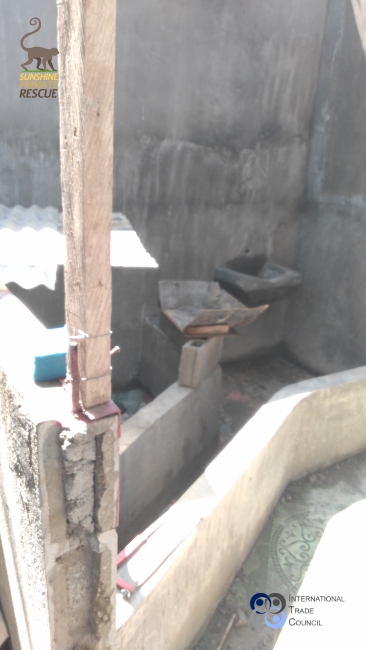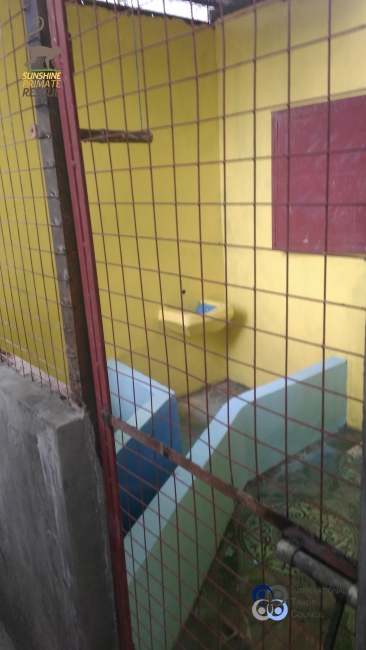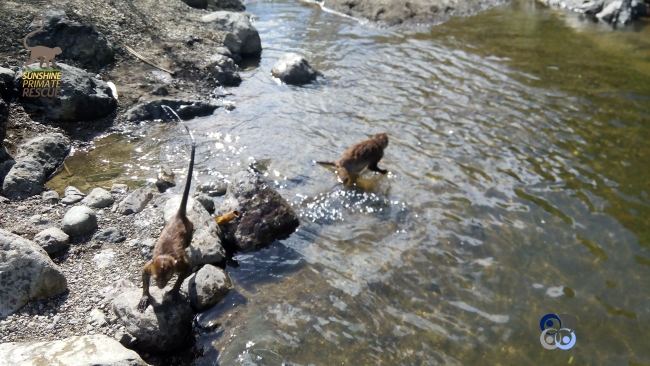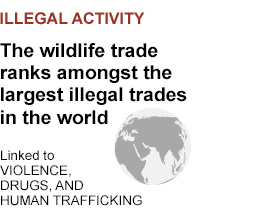About Sunshine Primate Rescue
Sunshine Primate Rescue originated after a series of wildlife trade 'buy and bust' operations involving staff from the International Trade Council and various government wildlife agencies from across South East Asia - targeting illegal traders of endemic (native) wildlife. When successful, these operations recover various quantities of endangered/rare and wild animals – some of which need to be housed at government-run facilities for long periods of time.
Monkeys, in particular, are the most troublesome as they have complex dietary and social needs and are not always suitable for re-release into the wild. As a result, these recovered animals were looking at futures of living their lives in solitary confinement in small and barren cages.
In an attempt to alleviate this issue the ITC has started constructing a purpose-built facility for the rescue, treatment, rehabilitation and long-term care of Asia’s illegally-traded monkeys under the banner of “Sunshine Primate Rescue”.
A Cycle of Misery for Illegally Traded Monkeys
Adding to the problem of what to do with un-releasable monkeys - end-buyers of illegally traded monkeys often self-surrender them a few years after acquisition. These animals are often brought in because their owners are either unable to afford their continued care (monkeys can live up to 30 years) or (most often) the animals have become aggressive. Movies and cartoons give us a warm spot in our hearts for monkeys and while it's true that they are cute, cuddly and intelligent as youngsters - they start to become aggressive and destructive adults. Left alone to themselves they may also become psychotic - hugging themselves, rocking, sucking their fingers, pacing in their cages or even self-mutilating. These monkeys become an additional burden on government-run wildlife centers who do not have the funds to maintain large-enough facilities for each animal or to pay suitable personnel who are able to help re-socialize the monkeys into captive tribes (where possible) and to teach them how to 'hunt'.
Monkeys Do Not Make Good Pets!
Monkeys are too social and intelligent animals to make good pets. They are just similar enough to humans to make us want one in our family, and just not similar enough to ever be happy there. Their pediatric dependency and friendliness fade as they mature to adults. They regress into neurotic self-destructive behaviors that are quite predictable and have nothing to do with the way you treat them. Monkeys need to be with other monkeys to develop normal social skills. If they are taken from their parents at an early age, sold on for a profit, caged individually and hand-raised, they will forever be social outcasts - unable to adjust to the normal social groups that monkeys need to form to be content.
Sunshine Primate Rescue is a rescue and rehabilitation program designed to save, care, re-skill and re-socialize (with other monkeys) these neglected animals.
Objectives of Sunshine Primate Rescue
Sunshine's objectives are:
- To rescue unwanted, ill-treated, abandoned or neglected monkeys - both from illegal wildlife traders, businesses and/or families with monkeys as sick, poorly kept, ill-treated or unwanted 'pets'.
- To provide residential care and, wherever possible, to normalize their relationships with other monkeys in order to re-socialize them to as close to a 'wild' environment as possible in a secure and permanent location.
- To educate, and provide support and advice to government agencies and the general public in the care of rescued/surrendered monkeys.
- To help eliminate the illegal trade of monkeys from across Asia and to re-educate the general public as to these animals real place in nature.
- To create jobs and bring infrastructure to communities who are at risk of becoming involved in the illegal wildlife trade.
Helping humans and animals:
To date the project has also:
- Created jobs for 18 long-term unemployed individuals.
- Brought in roads, drainage, sanitation systems and clean water
- Provided free high school and college education for various at-risk youths
The project is also currently in the middle of approvals for a pilot to create a skills training project to create jobs for unemployed youths in rural areas - teaching them masonry, welding and carpentry.
Developing suitable housing for animals:
The minimum cage size for individually kept - non-social or injured monkeys - is 10 ft x 6 ft x 8 ft and for 'tribes' of four or less the minimum size is 10 ft x 12 ft x 8 ft. The monkeys are provided with ample room (indoors and outdoors) for vigorous exercise, their own 6 ft x 2 ft x 2 ft swimming pool and a small, enclosed area for sleeping. Tire swings, climbing ropes and toys must be replaced constantly as monkeys grow bored without regular stimulation.
Each cage is partially roofed to allow sunbathing during the day as monkeys need vitamin D from the sun.
Cages are internally linked to one another by solid, sealed doors so that the animals may be moved for cleaning without causing them undue distress.
Cages are provided with rockeries for use in monkey play activities and are tiled for easy cleaning.


Ongoing care and normalizing of rescued animals behavior
Some rescued animals have been able to be trained how to climb trees, differentiate between 'good' and 'bad' flora and fauna, source local food for themselves and even swim. These animals are typically 'young' in age - although in one instance an older male joined an exiting 'tribe' of baby and teenager rescued monkeys and began to learn wild behavior from them.
As it is now these animals are only allowed out with a handler present who takes them for a literal (2km) walk down to a heavily forested river where they are allowed to play in the trees and go swimming for several hours at a time.
Ideally the rescue center will have enough resources to purchase additional hectares of land to enable certain rescues more time to roam freely in a forested and wild area on a more regular basis.

Above: Two rescued monkeys (aged 1.3 years and 2.1 years respectively) attempting to catch crabs in the local river.



